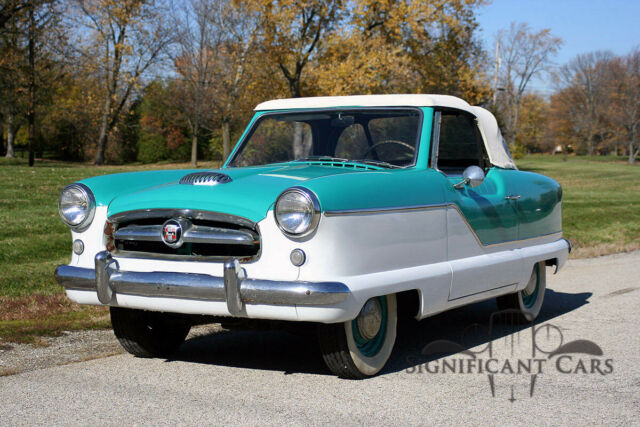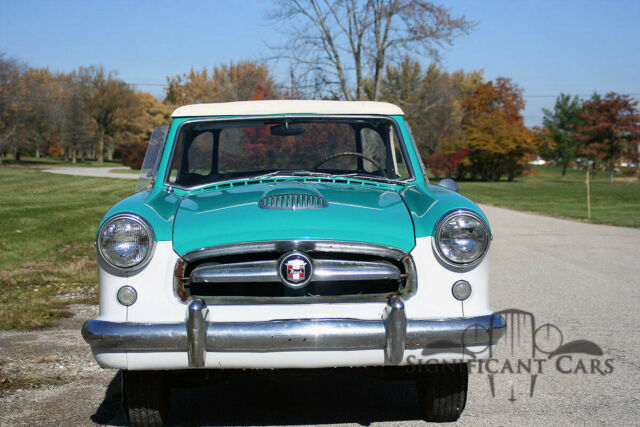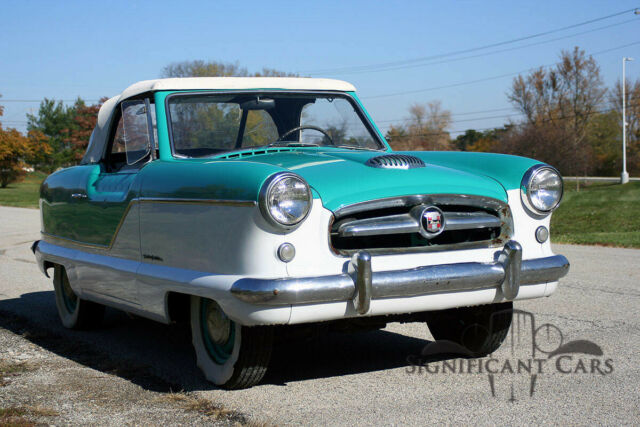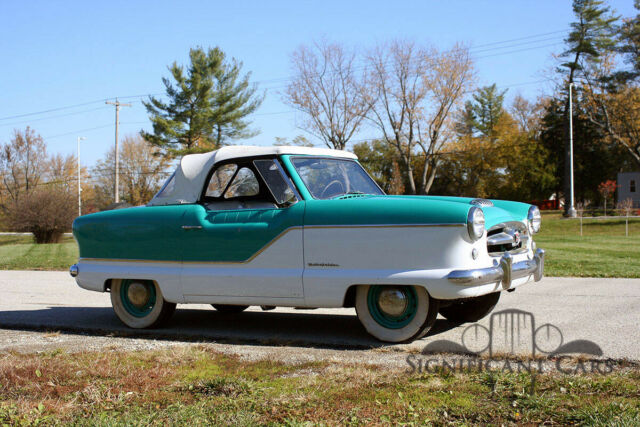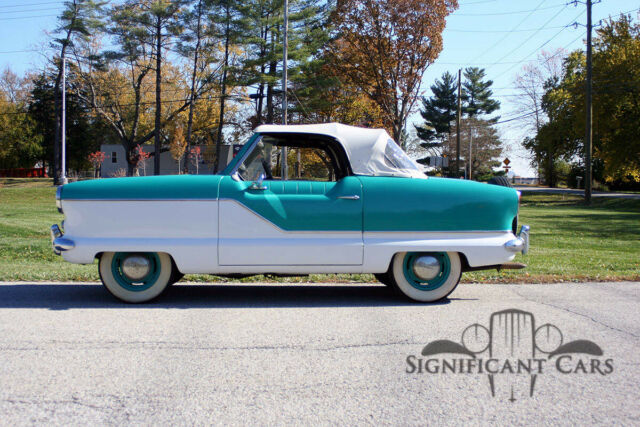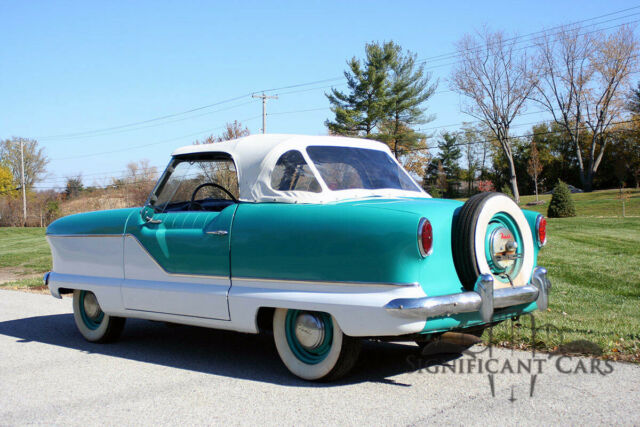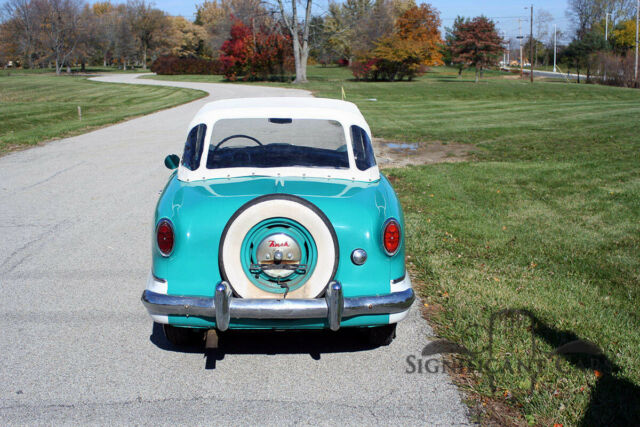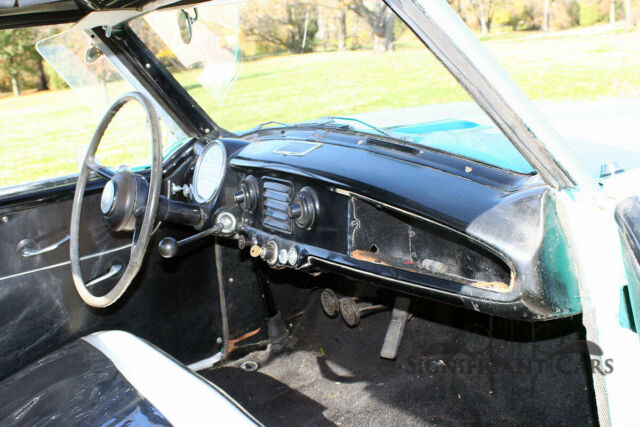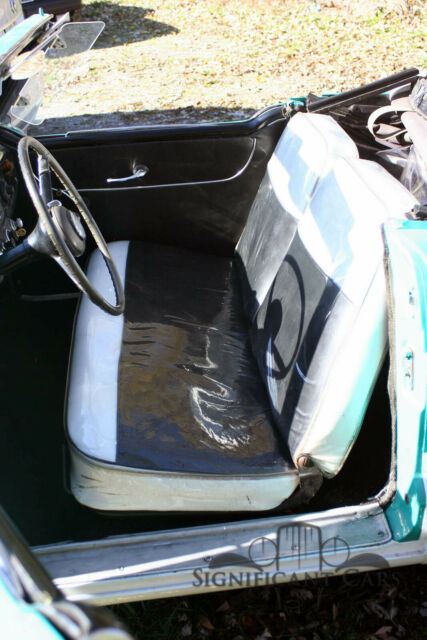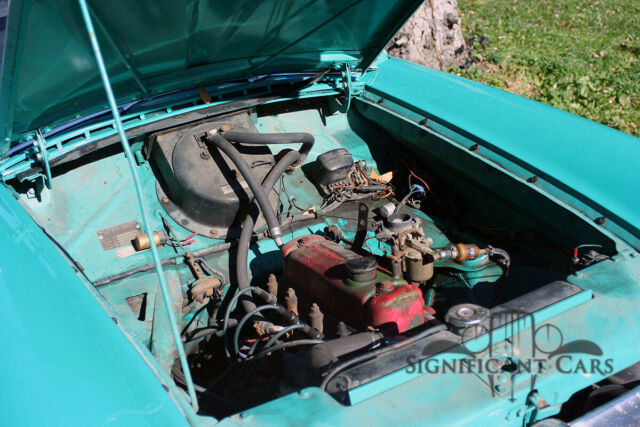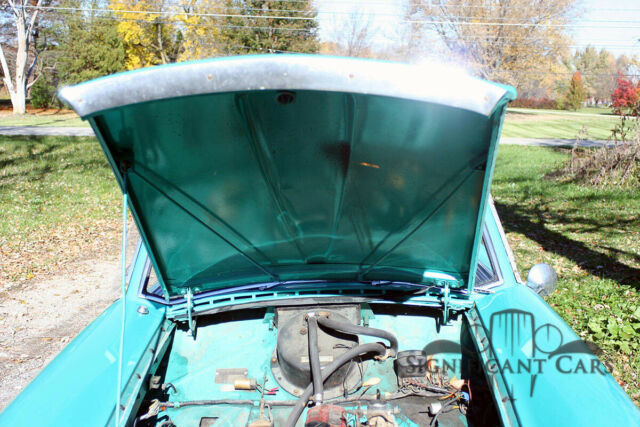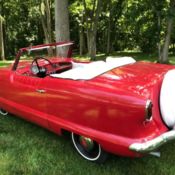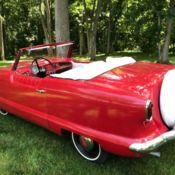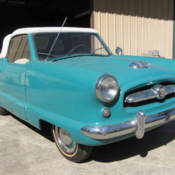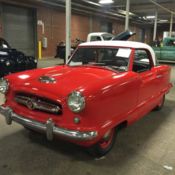1954 Nash Metropolitan Convertible - Rare NKI Custom!
Technical specifications of Nash 400 Series 1954
| Price: | US $14,500.00 |
|---|---|
| Condition: | Used |
| Item location: | Indianapolis, Indiana, United States |
| Make: | Nash |
| Model: | 400 Series |
| SubModel: | NKI |
| Type: | Convertible |
| Trim: | NKI |
| Year: | 1954 |
| Mileage: | 80000 |
| VIN: | E2810 |
| Color: | Teal & White |
| Engine size: | 1500cc 4 |
| Number of cylinders: | 4 |
| Transmission: | Manual |
| Drive type: | 3 Speed |
| Interior color: | Black & White |
| Options: | Convertible |
| Vehicle Title: | Clear |
| You are interested? | Contact the seller! |
Description
View our eBay StoreSign up for our Newsletter1959 Nash NKI Custom Metropolitan Convertible Offered as a Reserve auction.
This very nice older restoration has been held in the collection of a noted Automotive Historian and Author for many years. The car was recently recommissioned mechanically and runs and drives well. The car appears rust free, and is quite usable as is or would be a great basis for a restoration. It is complete, and really cleaned up quite well. We installed new tires and have doen some minor mechanical work to make it roadworthy.
It turns out this is one of the first 1869 "NKI Customs" built in 1954 prior to Nash deciding to name the car the Metropolitan. Dealers were instructed to rebadge the cars but a few had already been sold and retain the NKI badging. Only 48 NKI's are known to remain and this is 1 of only 7 known convertibles. It also has a very rare Croton Green (yellow) paint code, this color was discontinued after a short run due to paint matching issues at the plant, so is quite rare.
Cars were often titled when they were sold, so I guess this car didn't sell until 1956.
If you are looking for a rare Metropolitan convertible, this would be a great car to restore back to its original configuration, which would make a nearly one of a kind car. As it is, it is just the ticket for summer time cruising and economical commuting.
We have many more photographs of this car, please click on any image to be taken to our full-size image list!
The Nash Metropolitan is a car that was sold, initially, only in the United States and Canada, from 1954-1962. It conforms to two classes of vehicle: economy carand subcompact car. In today's terminology the Metropolitan is a "subcompactâ€, but this category had not yet come into use when the car was made. At that time, it was variously categorized, for example as a "small automobile" as well as an "economy car". The Metropolitan was also sold as a Hudson when Nash and Hudson merged in 1954 to form the American Motors Corporation (AMC), and later as a standalone marque during the Rambler years, as well as in the United Kingdom and other markets.
While most U.S. automobile makers were following a "bigger-is-better" philosophy, Nash Motor Company executives were examining the market to offer American buyers an economical transportation alternative. The Metropolitan was designed in the U.S. and it was patterned from a concept car, the NXI (Nash Experimental International), that was built by Detroit-based independent designer William J. Flajole for Nash-Kelvinator. It was designed as the second car in a two car family, for Mom taking the kids to school or shopping or for Dad to drive to the railroad station to ride to work: the "commuter/shopping car" with resemblance to the big Nash, but the scale was tiny as the Met's wheelbase was shorter than the Volkswagen Beetle's. The NXI design study incorporated many innovative features, and attempted to make use of interchangeable front and rear components (the symmetrical door skins were the only interchangeable items that made it into production). Although more complex, the new vehicle also incorporated Nash's advanced single-unit (monocoque) construction. It was displayed at a number of "surviews" (survey/previews), commencing on 4 January 1950 at the Waldorf-Astoria Hotel, New York, to gauge the reaction of the American motoring public to a car of this size. The result of these surviews convinced Nash that there was indeed a market for such a car, if it could be built at a competitive price. A series of prototypes followed that incorporated many of the improvements from the "surviews" that included roll-up glass side windows, a more powerful engine, and a column-mounted transmission shifter with bench seat (rather than bucket-type seats with floor shift fitted in the concept car). The model was named NKI (for Nash-Kelvinator International), and it featured revised styling incorporating a hood blister and rear wheel cutouts.Nash was positioning this new product for the emerging postwar market for "personal use" autos. These specific use vehicles were as a second car for women or an economical commuter car. The Metropolitan was also aimed at returning Nash to overseas markets. However, Mason and Nash management calculated that it would not be viable to build such a car from scratch in the U.S. because the tooling costs would have been prohibitive. The only cost-effective option was to build overseas using existing mechanical components, leaving only the tooling cost for body panels and other unique components. With this in mind, Nash Motors negotiated with several European companies. On October 5, 1952, they announced that they had selected the Austin Motor Company (by then part of BMC) and Fisher & Ludlow (which also became part of BMC in September 1953 under the name Pressed Steel Fisher), both English companies based around Birmingham, England. Fisher & Ludlow would produce the bodywork, while the mechanicals would be provided, as well as final assembly undertaken, by the Austin Motor Company. This was the first time an American-designed car, to be exclusively marketed in North America, had been entirely built in Europe. It became a captive import - a foreign-built vehicle sold and serviced by Nash (and later by American Motors) through its dealer distribution system. It is believed that the first pre-production prototype was completed by Austin on December 2, 1952. In all, five pre-production prototypes were built by Austin Motors and tested prior to the start of production. The total tooling cost amounted to US$1,018,475.94, (Austin: US$197,849.14; Fisher & Ludlow: US$820,626.80) which was a fraction of the tooling cost for a totally U.S.-built vehicle.
The styling for all Nash vehicles at that time was an amalgam of designs from Pininfarina of Italy and the in-house Nash design team. The different models from Ambassador down to the Metropolitan utilised very similar design features (fully enclosed front wheels, notched "pillow" style door pressing, bar style grille etc.). Whilst Nash used the fact that styling was by Pininfarina in their advertising for their larger models, Pininfarina refused to allow his name to be associated with the Metropolitan as he felt it would damage his reputation with other Italian car companies to be linked to such a small car. The new Metropolitan was made in two body designs: convertible and hardtop. All came with several standard features that were optional on most cars of the era. Among these factory-installed benefits for customers were a map light, electric windshield wipers, cigar lighter, and even a "continental-type" rear-mounted spare tire with cover. To give a "luxury" image to the interior, "Bedford cord" upholstery trimmed with leather was used (similar to larger Nash vehicles). An AM radio, "Weather Eye" heater, and whitewall tires were offered as optional extras for the U.S. market. (It is unlikely that a Metropolitan could have been purchased without a heater and radio, as all vehicles left the factory with both items fitted.) The Metropolitan was the first American car that was marketed specifically to women. The Dodge La Femme was introduced one year later. The first spokesperson for the car was Miss America 1954, Evelyn Ay Sempier, and the car was prominently advertised in Women's Wear Daily. American Motors' marketing brochures described the new model as "America's entirely new kind of car" (1955), "Luxury in Miniature" (1959), and "crafted for personal transportation" (1960).
7,456 Metropolitans were made for the US market in 1956. Our Ebay Policies:
Significant Cars is one of the largest Collector Car Brokers and Dealers in the Country. Since 2003 we have worked hard to "change the way collector cars find new homes" by providing unparralleled web presentation of the cars we are representing. Most of our cars have over 30 photographs, and these can be viewed by visiting our website (our eBay handle dot com), or by clicking on any of the photographs in the black background area of our EBay listings. We welcome your call with any questions about any of our listings at anytime at 800-837-9902 and certainly encourage your personal inspection of any of the cars we are selling-just call us and we will be happy to set up an appointment for your to see and test drive the car.
We realize that eBay is a difficult venue to properly evaluate an item as complex as an automobile. You can feel secure bidding with confidence on any of our cars since we guarantee your satisfaction! Should you win the auction and come to see the car and decide you do not want it for any reason, no negative feedback will result, any deposit you may have paid will be cheerfully refunded.
Description images and copy © 2004-2014 Significant Cars, Inc.
